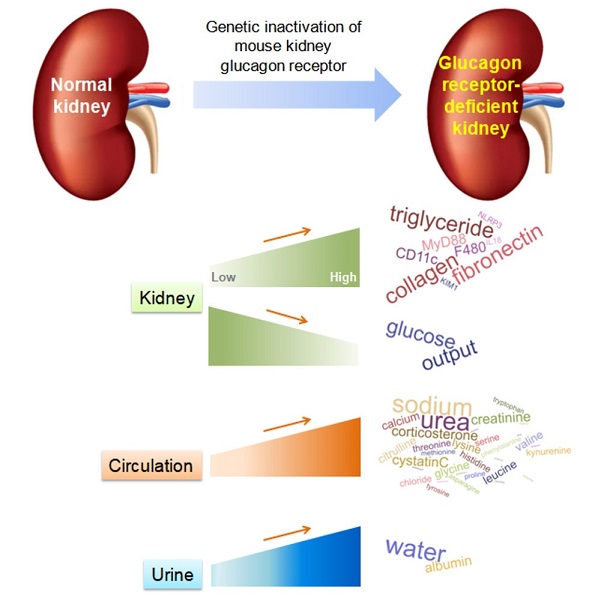Significance Of Renal Glucagon Receptors In Kidney Health And Chronic Kidney Disease
Nikhil Prasad Fact checked by:Thailand Medical News Feb 26, 2024 1 year, 2 months, 22 hours, 30 minutes ago
Medical News: The intricate interplay of hormones within the human body often reveals surprising connections between seemingly unrelated physiological functions. One such revelation has emerged from a groundbreaking study conducted by researchers at University of Texas Southwestern Medical Center-USA, shedding light on the pivotal role of glucagon in maintaining kidney health. Glucagon, primarily known for its role in promoting blood sugar production in the liver, has now been found to have protective effects on kidney function. The removal of glucagon receptors from mouse kidneys led to symptoms akin to chronic kidney disease (CKD), highlighting the hormone's importance in renal well-being.
 Graphical Abstract - Significance Of Renal Glucagon Receptors In Kidney Health And Chronic Kidney Disease
Glucagon and Kidney Health
Graphical Abstract - Significance Of Renal Glucagon Receptors In Kidney Health And Chronic Kidney Disease
Glucagon and Kidney Health
Glucagon, produced by cells in the pancreas, becomes active when blood sugar levels dip below a certain threshold. Traditionally recognized for its influence on liver cells to produce glucose for cellular energy, recent research has unveiled the presence of glucagon receptors in the kidneys. The study covered in this
Medical News report, led by Dr Philipp Scherer, Director of UTSW's Touchstone Center for Diabetes Research, utilized genetic techniques to eliminate glucagon receptors in mouse kidneys. The results were revealing - mice without kidney-based glucagon receptors exhibited symptoms mirroring CKD, including inflammation, scarring, excess lipid deposits, high blood pressure, and related kidney damage.
Understanding Kidney Glucagon Receptors
The researchers used two groups of mice for comparison - those without genetic manipulations and those with glucagon receptors deleted in the liver. Strikingly, only mice with removed glucagon receptors in the kidneys displayed pathologies affecting the organ. These pathologies included inflammation, scarring, excess lipid deposits similar to fatty liver disease, high blood pressure, alterations in energy-production genes, and signs of high oxidative stress. The findings emphasized the previously unclear role of kidney-based glucagon receptors in maintaining overall kidney health and systemic metabolic well-being.
Clinical Implications for Chronic Kidney Disease
The study's lead author, Dr May-Yun Wang, highlighted the relevance of these findings to CKD. Individuals with CKD have been observed to have fewer kidney glucagon receptors, raising questions about whether the deficiency precedes kidney pathology or results from it. The study provides a potential explanation for the observed improvements in kidney health in clinical trials of drugs targeting glucagon, particularly those in late-stage trials for obesity and diabetes. These drugs, showing promise in weight loss, may inadvertently benefit patients with CKD.
Elucidating the Role of Renal Glucagon Receptors
To delve deeper into the role of kidney glucagon receptors, the researchers explored their functions in normal renal function and disease development.
The study used mice with constitutive or conditional kidney-specific loss of the glucagon receptor (GCGR). The results demonstrated that kidney GCGR deficiency caused metabolic dysregulation and functional impairment of the kidneys. Mice lacking kidney GCGR displayed hyperaminoacidemia, reduced renal glucose output, oxidative stress, inflammation, excess lipid accumulation, hypertension, and fibrosis - key features reminiscent of CKD.
Chronic Kidney Disease - A Global Health Concern
Chronic kidney disease is a prevalent global health issue, affecting millions of people worldwide. The study highlights the urgent need for a comprehensive understanding of the underlying mechanistic aspects of CKD pathogenesis and progression. Despite significant progress in the field, there remain gaps in our knowledge regarding the precise physiological functions of renal GCGRs.
Kidney GCGRs and Systemic Homeostasis
The study also explored the expression and functions of kidney GCGRs, emphasizing their presence in nephron tubules and their influence on various aspects of renal function. Glucagon, known for its effects on renal glomerular filtration rate, electrolyte balance, urea excretion, and urine concentration, appears to be a crucial regulator of kidney metabolism and homeostasis.
Human Genetic Studies and CKD
Human genetic studies have identified associations between variants of the GCGR gene and various clinical conditions or diseases. Individuals with specific GCGR mutations exhibit abnormalities in sodium, potassium, and calcium ion handling, reduced glucose production, and hyperaminoacidemia - all factors relevant to kidney function. In CKD patients, the downregulation of kidney GCGR expression has been observed, suggesting a potential link between reduced renal GCGR expression and CKD development.
Implications for Future Research and Translational Medicine
The study's findings open avenues for future research into the causative role of renal GCGR downregulation in CKD development. Understanding the intricate mechanisms involved could pave the way for targeted therapeutic interventions. The translational implications of these findings are substantial, especially in the context of ongoing clinical trials for drugs targeting glucagon in obesity and diabetes, which may inadvertently benefit patients with CKD.
Conclusion
In conclusion, the deficiency of renal glucagon receptors has emerged as a significant factor contributing to various kidney issues, as illustrated by the study conducted at UT Southwestern Medical Center. The research not only defines the protective effects of glucagon on kidney health but also offers insights into the pathophysiological features of CKD. As we delve deeper into the molecular intricacies of renal glucagon receptors, the potential for innovative therapeutic strategies and improved patient outcomes becomes increasingly promising in the global battle against chronic kidney disease.
The study findings were published in the peer reviewed journal: Cell Metabolism.
https://www.sciencedirect.com/science/article/abs/pii/S1550413123004758
For the latest
Medical News, keep on logging to Thailand Medical News.
